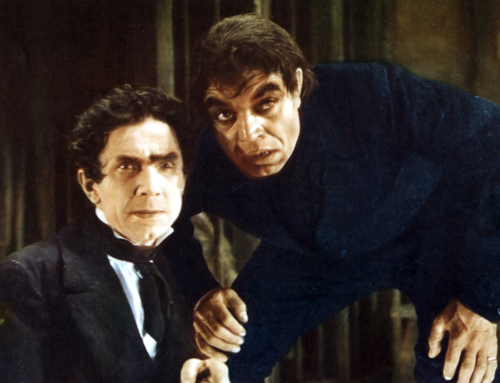 With Baz Luhrmann’s garish 3D hip-hop adaptation of F. Scott Fitzgerald’s The Great Gatsby rolling into theaters this week, my thoughts turn to a piece from last June’s Guardian in which novelist Jay McInerney (no relation) reflected on why Fitzgerald’s 1925 novel has become an American classic–and more than a classic: “a defining document of the national psyche, a creation myth, the Rosetta Stone of the American dream.”
With Baz Luhrmann’s garish 3D hip-hop adaptation of F. Scott Fitzgerald’s The Great Gatsby rolling into theaters this week, my thoughts turn to a piece from last June’s Guardian in which novelist Jay McInerney (no relation) reflected on why Fitzgerald’s 1925 novel has become an American classic–and more than a classic: “a defining document of the national psyche, a creation myth, the Rosetta Stone of the American dream.”
About the ambivalent attitude of Nick Carraway (Fitzgerald’s first-person narrator) toward Gatsby, McInerney writes:
“Nick Carraway doesn’t entirely approve of Jay Gatsby, the party-giving parvenu with his pink suits and his giant yellow circus wagon of a car. But he deeply admires Jay Gatsby the lover and the dreamer, the man for whom the mansion and the bespoke clothes were only the means to reclaim his first love. Nick admires his fidelity to that first love and his ability to keep it pure and undefiled, even as he wades through the muck to pursue it, even if the object of that love isn’t, in the flesh, worthy of such devotion.”
McInerney here identifies the chief theme of The Great Gatsby: the “grandeur” (however detestable the means) of those who worship what C.S. Lewis, in The Four Loves, terms Eros, i.e., the love that which turns the beloved into an idol, and which will stop at nothing–be it bootlegging, purchasing a mansion across from the beloved’s dock, or pink suits–in order to render the beloved fitting service.
Fitzgerald’s tale, in terms of its plot, is rather melodramatic and thin. As McInerney puts it, it is simply the “love story of a bootlegger and a Southern belle.” But Fitzgerald’s own fascination with Eros inspired him to wrap his tale in a garment of gorgeous prose that, as McInerney writes, “elevates a lurid and underdeveloped narrative to the level of myth.” What myth? The myth–or at least one version of the myth–of The American Dream.
“Fitzgerald,” writes McInerney, “conflates Jay Gatsby’s act of self-invention with the promise of the new world, with the dream of a fresh start upon which the nation was founded.” That conflation is made in Nick Carraway’s haunting meditation toward the very end of the book:
“And as the moon rose higher the inessential houses began to melt away until gradually I became aware of the old island here that flowered once for Dutch sailors’ eyes–a fresh, green breast of the new world. Its vanished trees, the trees that had made way for Gatsby’s house, had once pandered in whispers to the last and greatest of all human dreams; for a transitory enchanted moment man must have held his breath in the presence of this continent, compelled into an aesthetic contemplation he neither understood nor desired, face to face for the last time in history with something commensurate with his capacity for wonder.”
“To some,” concludes McInerney,
“this may seem like a lot of weight for the love story of a bootlegger and a southern belle to bear. But it seems to speak to a collective self-image dear to many American hearts–in spite of its unhappy ending. It’s possible we Americans are not entirely rational about The Great Gatsby. Gatsby becomes fabulously wealthy, but he doesn’t care about money in itself. He lives in a beautiful mansion and dresses beautifully, but everything he does is for love. He invents a hero called Jay Gatsby and then inhabits this creation, just as we hope to reinvent ourselves, some day, any day now, almost certainly starting tomorrow.”
Gatsby’s garish and rather insipid acts of self-invention are all for love. And again, though Fitzgerald may have intended Gatsby’s death to be a kind of martyrdom for Eros (a story of grandeur “in spite of its unhappy ending”), another way of reading the book–a better way, I would argue–is to see Gatsby’s demise, Daisy’s fecklessness, Tom Buchanan’s cruelty–as arguments for the tragic limitations, the poverty, of Eros, and thereby as arguments for the poverty of at least one version of The American Dream.
Books mentioned in this essay may be found in The Imaginative Conservative Bookstore.







I took Gatsby to be another story in the fight between aristocratic puritans who dabble in the demi-monde vs. capitalistic scots-irish catholics from the midwest. Its not stated in the novel but I felt that Tom & Daisy came to New York from the midwest because they wanted to get away from the fast growing capitalistic cities like Detroit & Chicago, filled with the nouveau riche. New York must have seemed like Europe compared to the midwestern cities built by the oil, steel & rail barons.